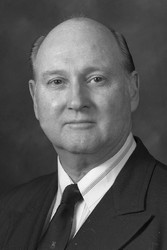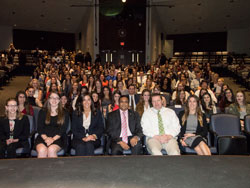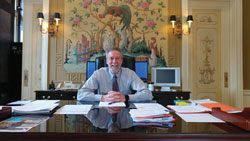Kenneth Stunkel, Ph.D., Emeritus Professor of History at Monmouth University, passed away on Feb. 7 in his Neptune, NJ home at the age of 87.
He is survived by his wife Mary Carol, his sister Shelley, his daughters Sally and Mirah, his son Reagan, grandson Elon, and three adoring pet cats.
Mary Carol, to whom he was married for 48 years, has been an adjunct professor of communication at Monmouth for 17 years. She said that her husband had, “a lifelong passion for learning new things; not to specialize too much [in one particular subject area] and to know that understanding comes from the knowledge of a broad range of subjects, so that you understand different perspectives.”
Stunkel taught through his 80th year, ending a 47-year tenure at Monmouth. He spent time as a professor of history, teaching over 25 different courses. He also served as the Dean of two different schools on campus: Art and Design and Humanities and Social Sciences.
“As a new faculty member, I remember going to meet with Ken to talk about teaching and I was consistently impressed by the breadth of his knowledge,” said Richard Veit, Ph.D., a professor of anthropology and Chair of the Department of History and Anthropology. “He was incredibly well read and was able to speak at length on all sorts of topics; he was impressive, and I was thrilled to be one of his faculty colleagues at Monmouth University.”
Vincent DiMattio, MFA, a professor of art and design, worked closely with Stunkel on numerous projects. In 2004, they co-authored the book, The Drawings and Watercolors of Lewis Mumford (Studies in Art History).
“There were times he pressured me, ‘Come on, we have to get this done,’ he wanted to go, go all the time,” said DiMattio jokingly on their time writing the book together. “It was a delight just working with him.”
Stunkel was the author of 10 academic books, including Ideas and Art in Asian Civilizations, Understanding Lewis Mumford: A Guide for the Perplexed, 50 Key Works of History and Historiography, and numerous scholarly articles.
Since retiring after his time at Monmouth, he co-authored a play, Lives of Reason, with friend and colleague Robert Rechnitz, Ph.D, former professor of American literature, which was produced in 2016. Last year, Stunkel’s second play, How to Live, was given a staged reading at Two River Theater in Red Bank, NJ.
Stunkel had a short career as a modern dancer in his 20s, then served in Korea as a psychiatric social worker in a mobile army surgical hospital (MASH) unit, and later as a choreographer of United Service Organizations (USO) soldier shows.
DiMattio said, “The productivity didn’t stop; he was either reading, writing, playing the piano, or listening to classical music. I never really knew him to say, ‘I’m going to go home and take a nap,’ I don’t think it was part of what he was all about.”
“Over the many years, it was very handy to have my own private Google search engine around the house,” said Mary Carol. “Ken had such breadth of knowledge that he really did almost always know the answer and he could explain it quickly.”
Along with Veit, DiMattio, and Mary Carol, Stunkel impacted the careers of many faculty members at Monmouth during his 47-year tenure.
Frederick McKitrick, Ph.D., a professor of history, said, “He’d be interested in the contributions you were making to scholarship, and in a way, that would help you with your career. He was always very nice to me and always very supportive of me, so I’m grateful for that.”
Thomas Pearson, Ph.D., a professor of history, said, “He was, with his wife Mary Carol, very generous in inviting my wife and me to his home and just making sure that I got off to a good start.”
Pearson and Stunkel worked closely together for many years. Pearson served as Provost and Vice President for Academic Affairs from 1992 to 2014 while Stunkel served as Dean of Art and Design from 1993 to 1996 and Dean of Humanities and Social Sciences from 1996 to 2001.
“He was in the best way, somebody who would push you to get better, so he was a big influence,” said Pearson.
Pearson stated that Stunkel had a great impact on numerous aspects of Monmouth, including teaching and curriculum, building scholarship, and helping it become a university. Pearson along with then Monmouth College President, Rebecca Stafford, Ph.D., chose Stunkel to write the final application to the state for the college to become a teaching university in 1995.
“He was such a gifted writer, everybody who dealt with him knew that,” said Pearson. “He just had a way with words.”
John Morano, a professor of journalism, said Stunkel was a big influence on him while he was writing his series, The Morano Eco-Adventure Series. “He was open-minded and expected everyone to produce scholarship, whatever it might be in their discipline,” said Morano. “In my case, I was writing environmental novels and to my great satisfaction, Ken Stunkel embraced that and that actually encouraged me to do more and to do it better.”
Stunkel is cited by his colleagues as being instrumental in creating the framework for general education curriculum requirements for students, including critical discourse and interdisciplinary courses.
“I think that reflected his essence as an academic, that is the conviction that an educated person should know about literature, the arts, and the sciences,” said McKitrick. “Somebody like him would never say, ‘I’m not a science person or I’m not a math person.’”
“He was a force of nature, a good friend, and a great colleague,” said Pearson. “We as a university, are in the place we’re in today, to a significant degree, because of all he did.”
A memorial celebration for Stunkel’s life will be held in Wilson Hall on April 8, from 3 p.m. to 5 p.m. In lieu of flowers, donations may be made to Monmouth University or Two River Theater.
PHOTO COURTESY of Monmouth University



